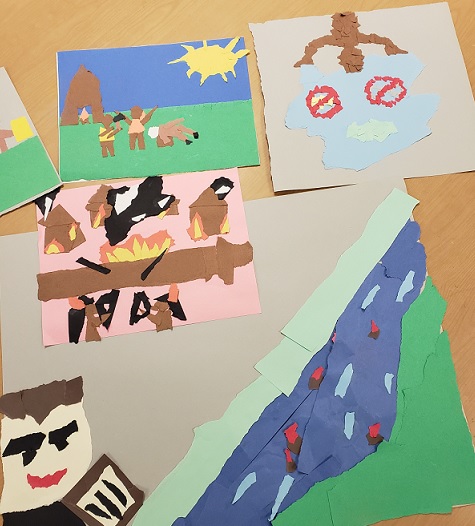 The Offer
The Offer
Several years ago, I was asked by a major edu-organization for whom I did some work to lead a week-long training in Jordan. Like, the country. In the Middle East. Far away.
The workshop was for no less than the King’s Academy – a prestigious boarding school founded and regularly visited by, you know… the KING. Like, of Jordan. The country. In the Middle East. Far Away.
Of course I said yes, and it turned out to an amazing experience in more ways than I’ll attempt to recount here. There was, however, something that confused me.
I’m pretty good at the teacher workshop thing. I could fake some basic humility about it, but it would be disingenuous and – unless you’re new to the blog – you’d never buy it.
What I’m not always successful at is making people in power happy with me. While I liked to think I carried some notoriety in my little corner of the world, I was hardly the first name that should have come to mind when someone in Manhattan said, “We have a chance to make a strong first impression and promote our rather uptight branding in a potentially lucrative foreign market – whom shall we send forth?”
How I was even on that particular list?
The Question
I kept wondering, so I called my primary contact at the all-seeing acorn and asked. Of all the legit, reliable options (many published and several revered in ways I find rather unhealthy), how many turned you down before my name came up?
None, it turned out. I was the first and only person in my content area who they’d asked. There’d apparently been a bit of a discussion about it – the details of which my contact was kind enough to blur over – and it was determined after much consideration that I was – wait for it…
Flexible.
My handler assured me my qualifications were perfectly solid. (I knew that, but I used to sometimes at least try to project some of that humility I mentioned earlier.) I had every right to be on the list, etc., etc.
But this was going to be something potentially outside the norm. The flight itself would be nearly 13 hours, and the schedule once we arrived remained unsettled. I should have such and such resources available, but they couldn’t be certain. I should have X number of hours with Y number of teachers expecting this and that, but it might not be the same group every day.
 The institution was unlike any they’d partnered with up to that point, and teachers with whom I’d be working would be a mix of the traditional adherents to Islam (in full burqas and with their own set of cultural norms), progressive American transplants (no doubt wearing hemp sandals and still carrying an unhealthy attachment to Dave Matthews), and a range of unknowns in-between and beyond.
The institution was unlike any they’d partnered with up to that point, and teachers with whom I’d be working would be a mix of the traditional adherents to Islam (in full burqas and with their own set of cultural norms), progressive American transplants (no doubt wearing hemp sandals and still carrying an unhealthy attachment to Dave Matthews), and a range of unknowns in-between and beyond.
In short, I’d be operating with serious jet lag in an unfamiliar setting for high stakes in an unpredictable environment. Oh, and the King would be attending at least one major event while we were there. His wife was giving that year’s commencement speech and we had really good seats.
It seemed, then, that while my other qualifications were a necessary precursor, what bumped me to the top was the perception that I was…
Flexible.
The Irony
I suppose I was a bit less uptight than some, particularly when being paid to be inspiring and promote good pedagogy and such. I always appreciated the accommodations and the endless food and the quality of the people with whom I worked during that time.
Still, I can be impatient and rather elitist. I’m quick to judge and slow to listen at all the worst times. I enjoy antagonizing people and talk too much when I’m not sure what to say. I can be great company… IF I already like you and IF I find you entertaining and IF you’re appropriately enamored with me.
Otherwise, I have stuff to do. Like, I dunno… Spider Solitaire.
But I had been discussed. I had been debated – possibly with actual emotions involved! And I had been decreed…
Flexible.
For the rest of the prep time and throughout that trip, that’s exactly what I was. In retrospect, it became both a badge of honor and a battery pack of reserve energy. Clichéd as it sounds, I became what I was labeled – often without fully realizing it.
The Flight
As it turns out, roughly everyone on the planet was heading to Jordan at the same time as me. Apparently, many families who live in the states during the school year return home for the summer. They don’t vacation there so much as move back for ten weeks. Never in my life have I watched so many people check through so much luggage. I’m talking literally twenty or more large suitcases and duct-taped boxes per family.
 Needless to say, this slowed down the ticketing process substantially. I was concerned I might miss my flight, despite having arrived well ahead of what would normally be necessary. Still, I didn’t fret. I hadn’t even left Chicago and the trip was already proving to be something of an adventure! Besides, I was…
Needless to say, this slowed down the ticketing process substantially. I was concerned I might miss my flight, despite having arrived well ahead of what would normally be necessary. Still, I didn’t fret. I hadn’t even left Chicago and the trip was already proving to be something of an adventure! Besides, I was…
Flexible.
The plane itself held around 14 million people, most of them children. The volume of their collective discomfort, boredom, colic, coughing, and – as the flight wore on – whining, was beyond anything I thought possible in a confined space. Passengers freely passed around whatever medications or home remedies they’d thought to bring, but in any other situation I’d have found the hours of mini-person bedlam unbearable.
Except that I didn’t. I don’t mean that I faked it better than usual. I mean that for whatever reason I just kinda… accepted it. I was aware of the chaos, but atypically un-phased. You know…
Flexible.
I’m told I radiate an anti-social mojo on planes so thick it’s literally venomous. It’s a rare journey when a stranger finds me in any way approachable.
But one did this time. He wanted to know everything about me, why I was flying to Jordan, what I knew about it, etc. He shared his life story with me, up to and including his current plans, and everything I needed to know about the country while I was there.
Strangely, I didn’t mind. Not this time. He wasn’t all that interesting, but he wasn’t overly boring. He happened, and that was OK. Apparently, I’m actually quite…
You get the idea.
Arrival
And so it went. Remember that endless luggage being checked when I was trying to depart? It had to be picked up when we arrived in Jordan. All of it. A single baggage retrieval station with a squeaky conveyor belt, inundated by approximately 19 million suitcases and large, duct-taped boxes.
It took hours. Literally. I was very aware of the time because I was supposed to meet a driver from the Academy who couldn’t possibly know why I hadn’t appeared despite my flight having landed nearly two hours before. I didn’t panic, exactly, but neither was I sure I knew how to contact the Academy, or even call a taxi.
Actually, I wasn’t sure if they had taxis in Jordan. (They do.) How embarrassing.
Still, I tried to focus on what I could control and what I couldn’t. Besides, people in the know consider me…
Flexible.
The week turned out to be a great success. I learned as much as my participants, many great discussions were had, and yada yada yada. It was totes nifty by any measure – no joke.
The workshop schedule changed several times as predicted, and our social itinerary took some unexpected turns as well. The flight back was just as long, although I managed to sleep much of that one. (All those unhappy little children were still in Jordan.)
The Lesson
 In retrospect, I can’t get over the power of a simple label: “Flexible.” It’s not like I’m new to the concept that it matters what we assume about others. It especially matters how we speak to – or even about – our students.
In retrospect, I can’t get over the power of a simple label: “Flexible.” It’s not like I’m new to the concept that it matters what we assume about others. It especially matters how we speak to – or even about – our students.
Not that we can manipulate this in any predictable way. It’s ridiculous how often it seems we can’t so much as dent their mindset despite nuclear effort, while other times a single comment on our part can save or destroy them – at least for that day. Sometimes for much longer.
In my experience, such “labeling” also has to be real. If I were a genuinely inflexible personality, or otherwise fundamentally unsuited for this particular experience, no amount of rhetoric would change that. I don’t think we can just call kids “smart” or “hard-working” repeatedly and turn lead to gold.
What we can do, however, intentionally latch onto positives which are genuinely there, however buried or corrupted at the moment. We can notice and appreciate them at opportune moments. Ideally, we’ll find ways to cultivate those characteristics in hopes they grow and gain prominence in the overall mix. Perhaps it’s not “labeling” so much as “recognizing” or “validating.”
It’s impossible to predict what this looks like with a given teacher or a particular child, let alone guarantee what will work in any specific situation. So, we focus on building relationships and keep doing our best although sometimes we get it wrong. We find ways to maintain our convictions despite the insanity around us. The needs are so great, and our abilities so small, but we show up every day and try again – just like we ask them to do.
Oh, and along the way it helps if you’re able to stay, you know…

RELATED POST: Why Kids Learn (a.k.a. ‘The Seven Reasons Every Teacher MUST Know Why Kids Learn!’)
RELATED POST: Teach Like You
RELATED POST: It’s About What You Believe (Wonder Woman)

 I’m a sucker for superhero movies. They’re a sub-genre of sci-fi, and the best sci-fi takes us out of our reality, out of our time and place, to better comment on that reality and force fresh eyes on our time and place. A good superhero picture isn’t about the cool powers and mega-battles; it’s about becoming better versions of our boring ol’ selves.
I’m a sucker for superhero movies. They’re a sub-genre of sci-fi, and the best sci-fi takes us out of our reality, out of our time and place, to better comment on that reality and force fresh eyes on our time and place. A good superhero picture isn’t about the cool powers and mega-battles; it’s about becoming better versions of our boring ol’ selves. I can’t speak with any authority about how faithful it is or isn’t to the comics. I was more of a Spider-Man and Fantastic Four guy, so Lynda Carter was about as close as I got to really knowing this character before now. So it’s this recent movie version of Wonder Woman, and the ethos surrounding her, that fascinates me at the moment.
I can’t speak with any authority about how faithful it is or isn’t to the comics. I was more of a Spider-Man and Fantastic Four guy, so Lynda Carter was about as close as I got to really knowing this character before now. So it’s this recent movie version of Wonder Woman, and the ethos surrounding her, that fascinates me at the moment. Granted, in this context the words are literally true. Diana – our “Wonder Woman” – is supernaturally created to fight the God of War and Human Corruption. But they’re also universal – especially for so many of our young ladies. As a culture, we’ve indoctrinated them to doubt everything about themselves, insisted they remain weak, and exploited them as part of our fallen nature.
Granted, in this context the words are literally true. Diana – our “Wonder Woman” – is supernaturally created to fight the God of War and Human Corruption. But they’re also universal – especially for so many of our young ladies. As a culture, we’ve indoctrinated them to doubt everything about themselves, insisted they remain weak, and exploited them as part of our fallen nature. Once highlighted, this message is everywhere in the picture. The next time you watch it (and you know you will), notice moments like this one in the trenches of WWI as Steve Trevor tries to argue with our hero:
Once highlighted, this message is everywhere in the picture. The next time you watch it (and you know you will), notice moments like this one in the trenches of WWI as Steve Trevor tries to argue with our hero: Diana, of course, decides to join him, convinced that “if no one else will defend the world from Ares, then I must… I am willing to fight for those who cannot fight for themselves.” She does not yet know that she is chosen for this; it is duty, made by choice, which drives her. Her mother explains that if she leaves, she can never return – literally true in Amazon mythology, but universally true of any meaningful journey. Whatever we set ourselves to do, once we step out, we will be forever changed in some way. None of us can ever go home – not in the sense of returning from where we came. We’ve changed. It probably has, too.
Diana, of course, decides to join him, convinced that “if no one else will defend the world from Ares, then I must… I am willing to fight for those who cannot fight for themselves.” She does not yet know that she is chosen for this; it is duty, made by choice, which drives her. Her mother explains that if she leaves, she can never return – literally true in Amazon mythology, but universally true of any meaningful journey. Whatever we set ourselves to do, once we step out, we will be forever changed in some way. None of us can ever go home – not in the sense of returning from where we came. We’ve changed. It probably has, too. Everywhere Diana goes are people (and animals) suffering who don’t deserve to suffer. Corruption hurts everyone, not just the bad people. Or maybe it does – maybe we’re all ‘the bad people.’ As events begin to unravel (an essential part of any hero’s journey), Wonder Woman begins to doubt…
Everywhere Diana goes are people (and animals) suffering who don’t deserve to suffer. Corruption hurts everyone, not just the bad people. Or maybe it does – maybe we’re all ‘the bad people.’ As events begin to unravel (an essential part of any hero’s journey), Wonder Woman begins to doubt… 
 Teacher retention is a… challenge – ‘challenge’ here meaning ‘nightmare-of-impossibility-dear-god-what-are-we-going-to-do?!?’
Teacher retention is a… challenge – ‘challenge’ here meaning ‘nightmare-of-impossibility-dear-god-what-are-we-going-to-do?!?’